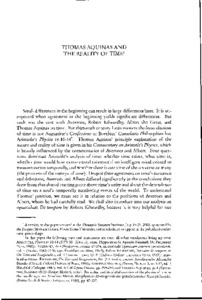Por favor, use este identificador para citar o enlazar este ítem:
https://repositorio.uca.edu.ar/handle/123456789/12749| Título: | Thomas Aquinas and the reality of time | Autor: | Snyder, Steven C. | Palabras clave: | Tomás de Aquino, Santo, 1225?-1274; FILOSOFIA MEDIEVAL; ANALISIS FILOSOFICO; COSMOLOGIA; TIEMPO | Fecha de publicación: | 2000 | Editorial: | Pontificia Universidad Católica Argentina. Facultad de Filosofía y Letras | Cita: | Snyder, S. C. Thomas Aquinas and the reality of time [en línea]. Sapientia. 2000, 55 (208). Disponible en: https://repositorio.uca.edu.ar/handle/123456789/12749 | Resumen: | Resumen: Small differences in the beginning can result in large differences later. It is unexpected when agreement in the beginning yields significant differences. But such was the case with Averroes, Robert Kilwardby, Albert the Great, and Thomas Aquinas on time. For thirteenth century Latin masters the locus classicus of time is not Augustine's Confessions or Boethius' Consolatio Philosophiae but Aristotle's Physics iv.10-142. Thomas Aquinas' principie explanation of the nature and reality of time is given in his Commentary on Aristotle's Physics, which is heavily influenced by the commentaries of Averroes and Albert. Four questions dominate Aristotle's analysis of time: whether time exists, what time is, whether time would have extra-mental existence if no intelligent mind existed to measure events temporally, and whether there is one time of the universe or many (the problem of the «unity» of time). Despite their agreement on time's existence and definition, Averroes and Albert differed significantly in the conclusions they drew from that shared starting point about time's unity and about the dependence of time on a soul's temporally numbering events of the world. To understand Thomas' position, we must see it in relation to the positions of Averroes and Albert, whom he had carefully read. We shall also introduce into our analysis an opusculum De tempore by Robert Kilwardby, because it is very helpful for our seeing the implications of Averroes' position. I have found no internal evidence in the texts indicating that Thomas read Kilwardby's De tempore3. Yet a comparison of Thomas' and Kilwardby's positions on the unity of time is useful in applying Thomas' insights to a modern cosmology which denies the existence of the sphere of the fixed stars, which played so important a part in medieval Aristotelians' explanations of time's unity. Thomas in the Physics Commentary defends a position on the extra-mental reality of time which protects the realist basis of Aristotelian physics in a way that Averroes' position undermines. Thomas' position is historically important for Aristotelian natural philosophy and philosophically important today, given current emphasis on chronometrics, time measurement. | URI: | https://repositorio.uca.edu.ar/handle/123456789/12749 | ISSN: | 0036-4703 | Disciplina: | FILOSOFIA | Derechos: | Acceso abierto | Fuente: | Sapientia. 2000, 55 (208) |
| Aparece en las colecciones: | SAP - 2000 Vol LV nro. 208 |
Ficheros en este ítem:
| Fichero | Descripción | Tamaño | Formato | |
|---|---|---|---|---|
| thomas-aquinas-reality-time.pdf | 225 kB | Adobe PDF |  Visualizar/Abrir |
Visualizaciones de página(s)
115
comprobado en 27-abr-2024
Descarga(s)
874
comprobado en 27-abr-2024
Google ScholarTM
Ver en Google Scholar
Este ítem está sujeto a una Licencia Creative Commons

